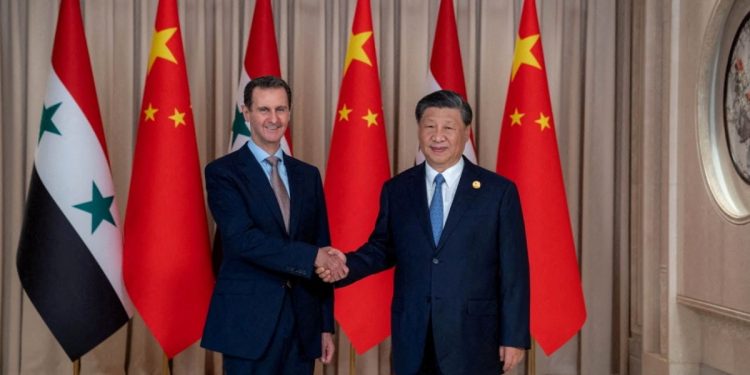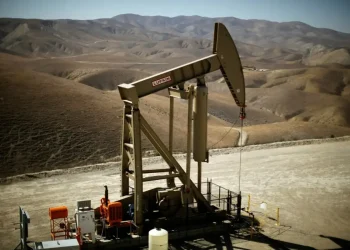China quietly aligned with al-Assad through UNSC vetoes, investments and aid, but has not been directly involved in the war like Iran or Russia.
As China hosted the 19th Asian Games in September last year, President Xi Jinping welcomed Syrian leader Bashar al-Assad at a picturesque lakeside guesthouse in the eastern city of Hangzhou.
By the time Xi and al-Assad emerged from their meeting, China and Syria had struck what they called a “strategic partnership.”
A little over a year later, that partnership lies in tatters, after opposition rebel groups, led by Hayat Tahrir al-Sham (HTS), took hold of the Syrian capital Damascus on Sunday, overthrowing al-Assad, who has fled to Russia.
Since then, China has been cautious in its response to the rapid shifts in Syria. On Monday, the Chinese foreign ministry said that a “political solution” must be found in Syria as soon as possible to restore stability.
But while that caution also captures how China has approached its relationship with Syria more broadly, al-Assad’s sudden ouster affects the world’s second-largest economy just as it is increasingly trying to expand its footprint in the Middle East, say analysts.
So what has China’s relationship with Syria been, and how will it change with new leadership in Damascus?
The Syrian war sprung up in 2011 after al-Assad cracked down on protests against his government. The protests then developed into a rebellion, with multiple groups involved.
The governments of Russia and Iran, Lebanon’s Hezbollah, and some other Iran-aligned groups in the region have backed al-Assad. The United States, Turkiye, and most Middle Eastern nations have meanwhile been critical of al-Assad, and his brutal crackdown on civilian populations and the political opposition.
“The future and destiny of Syria should be decided by the Syrian people, and we hope that all the relevant parties will find a political solution to restore stability and order as soon as possible,” Mao Ning, China’s foreign ministry spokesperson said at a regular news conference on Monday.
However, while China has not had direct military involvement in the Syrian war unlike Iran and Russia, the relationship between Damascus and Beijing was cosy while al-Assad was in office.
And it was growing warmer.
The Syrian leader’s Hangzhou visit was his first official trip to the country in almost two decades. During this trip, China pledged to help al-Assad with Syria’s reconstruction after more than a decade of war, at a time when the Syrian leader was a pariah for many nations around the world.
“Faced with an international situation full of instability and uncertainty, China is willing to continue to work together with Syria, firmly support each other, promote friendly cooperation, and jointly defend international fairness and justice,” Xi told al-Assad, according to Chinese state media.
What happened in Syria?
Xi added that relations between the two countries “have withstood the test of international changes”.
China has used its veto power in the United Nations Security Council (UNSC) to block draft resolutions critical of al-Assad on 10 occasions. That’s out of 30 resolutions related to the Syrian war proposed at the UNSC.
In September 2019, Russia and China vetoed a draft resolution that called for a ceasefire in Syria’s Idlib, a rebel strong-hold.
“I think the Chinese, as they have done a fair few times, have gone along with the Russians for solidarity but it really was the Russian objection to this resolution,” media’s Diplomatic Editor James Bays said then.
But China has been more than a sidekick to Russia in Syria. In the last decade, China ramped up its financial assistance to Syria, an indicator of its backing of al-Assad’s government.
In December 2016, the Syrian government secured a victory against the rebels when it retook the city of Aleppo. This marked a turning point in China’s aid strategy, according to the Cyprus-headquartered independent risk and development consultancy, the Center for Operational Analysis and Research (COAR).
China’s aid to Syria jumped 100 times from roughly $500,000 in 2016 to $54m in 2017, according to COAR reports. In October 2018, China donated 800 electrical power generators to Latakia, Syria’s largest port.
Beijing has also made major, long-term investments in Syrian oil and gas – totalling about $3bn.
In 2008, China’s petrochemical enterprise Sinopec International Petroleum Exploration and Production Corporation brought Canada’s Calgary-based Tanganyika Oil company in a deal worth about $2bn. Tanganyika had a production-sharing agreement with Syria and held operating interests in two Syrian properties.
In 2009, China’s state-owned multinational company Sinochem bought British oil and gas explorer Emerald Energy, which operates in Syria, for $878m.
And in 2010, the China National Petroleum Corporation (CNPC) signed an agreement with Shell to acquire a 35 percent stake in Shell’s Syria unit.
Earlier this year, Syria’s Minister of Electricity Ghassan Al-Zamel confirmed a 38.2 million-euro (about $40m) contract with a Chinese company to construct a large photovoltaic plant near Syria’s western city Homs, according to Berlin-based publication, The Syria Report.
In 2022, Syria also joined Xi’s Belt and Road Initiative (BRI), a network of highways, ports and railroads that China is building, connecting Asia to Africa, Europe and Latin America.










 American Dollar Exchange Rate
American Dollar Exchange Rate